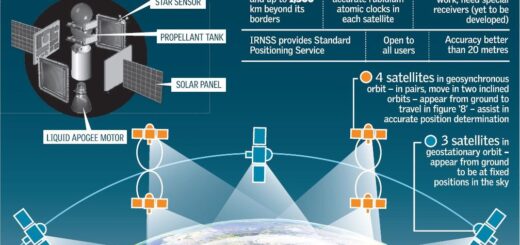National Current Affairs – UPSC/IAS Exams- 28th September 2019
Quad Meet
Topic: International Groupings
In News: The foreign ministers of the Quad countries – India, US, Australia and Japan – met on the sidelines of the UNGA meeting.
More on the Topic:
- The Ministers met to discuss cooperation on counter-terrorism, mentoring, assistance in disaster relief, airtime security, cooperation, development, finance and cybersecurity efforts etc.
- The Quad countries were “resolute” in their view of the centrality of the Association of South East Asian Nations (ASEAN) in South East Asia.
- The notion of ASEAN centrality broadly refers to the group of countries being at the centre of security and strategic frameworks for the Asia-Pacific region.
About Quad Grouping:
- The Quadrilateral Security Dialogue is currently an informal but increasingly being formalised strategic dialogue between the United States, Japan, Australia and India.
- It is aimed at free and secure Indo-Pacific to counter China’s aggressive String of Pearls strategy in the region with specific focus areas of freedom of navigation, maritime security cooperation, joint military exercises, security and integrity of friendly nations, counterterrorism, humanitarian assistance and disaster relief, development finance, and cybersecurity.
Significance of the grouping:
- Members share a vision of an open and free Indo-Pacific.
- It is one of the many avenues for interaction among India, Australia, Japan and the US and should not be seen in an exclusive context.
Source: Hindu
G-4 Meeting
Topic: International Groupings
In News: The foreign ministers of G-4 grouping also held a meeting on the sidelines of the 74th session of the United Nations General Assembly (UNGA).
More on the Topic:
- G-4 is a group of four countries i.e. Brazil, Germany, India and Japan which support each other’s bids for permanent seats on the United Nations Security Council (UNSC).
- The G-4 countries have decided to prepare for a fresh push for reforms at the UNGA in 2020 when the UN celebrates its 75th anniversary.
- It was highlighted that there is a clear need for an enhanced role of developing countries and of major contributors to the United Nations to make the UNSC more legitimate, effective and representative.
- This means that India and Brazil the two developing countries in G-4 grouping should get a place along with China, which is the only developing country in the UNSC.
- The countries also put a focus on the role of the African continent in the Council.
- G-4 said that the reforms-related decisions should be by a two-third majority in the UN General Assembly, which was enshrined in the 1998 resolution of the UNGA.
- This is contrary to the position taken by China, which has always said that the decisions should be taken through “comprehensive consensus”.
Source: Hindu
Rural Sanitation Strategy: 2019-2029
Topic: Governance
In News: The Department of Drinking Water and Sanitation (DDWS) under the Ministry of Jal Shakti has launched the 10-year Rural Sanitation Strategy starting from 2019 up to 2029.
More on the Topic:
- The strategy has been prepared by DDWS, in consultation with the State Governments and other stakeholders.
- It lays down a framework to guide local governments, policy-makers, implementers and other relevant stakeholders in their planning for Open Defecation Free (ODF) Plus status, where everyone uses a toilet, and every village has access to solid and liquid waste management.
- The strategy aims to sustain the behavioral change regarding sanitation that has been achieved under the Swachh Bharat Mission Grameen (SBM-G) and ensure that the focus is shifted to increasing access to solid and liquid waste management in the rural areas of the country.
- The 10-year strategy also demands focused intervention through capacity strengthening, IEC (Information, Education, and Communication), organic waste management, plastic waste management, and water management.
- Public financing has played an important role in the ODF journey but for the maintenance of toilets and infrastructure, the need is there for innovative models for sanitation financing.
- With regard to waste management elements, there will have to be a convergence of funds from different stake holders.
- Discussions are still underway on the budget requirement and whether funds will be disbursed via a centrally sponsored scheme or through Finance Commission transfers to PRIs.
- The strategy highlights the potential collaborations with development partners, civil society and intergovernmental partnerships.
About Open Defecation Free (ODF), ODF+, ODF++ Statuses:
- ODF: An area can be notified or declared as ODF if at any point of the day, not even a single person is found defecating in the open.
- ODF+: This status is given if at any point of the day, not a single person is found defecating and/or urinating in the open, and all community and public toilets are functional and well maintained.
- ODF++: This status is given if the area is already ODF+ and the faecal sludge/septage and sewage are safely managed and treated, with no discharging or dumping of untreated faecal sludge and sewage into the open drains, water bodies or areas.
Source: Hindu
Exercise KAZIND – 2019
Topic: Bilateral Relations
In News: Joint Military Exercise KAZIND-2019 between India and Kazakhstan will be conducted in Uttarakhand.
More on the Topic:
- The joint military exercise will enhance the level of defence cooperation further fostering bilateral relations between the two nations.
- The aspects of emerging trends of hybrid warfare have also been included under exercise.
- Russia’s approach to Ukraine is an example of this form of warfare. It has involved a combination of activities, including disinformation, economic manipulation, use of proxies and insurgencies, diplomatic pressure and military actions.
Source: Indian Express
World Tourism Day 2019
Topic: Economy
In News: World tourism day commemorated each year on 27 September, with celebrations led by UNWTO. India has been selected as the host country for celebration of World Tourism Day 2019 by United Nations World Tourism Organization (UNWTO).
More on the Topic:
- The day of September 27 was chosen for World Tourism Day because the Constitution of the World Tourism Organization was accepted on this day in 1970.
- 2019 theme: “Tourism and jobs: a better future for all”.
About World Tourism Organisation:
- The World Tourism Organization (UNWTO) is the United Nations agency responsible for the promotion of responsible, sustainable and universally accessible tourism.
- UNWTO’s membership includes 158 countries, 6 Associate Members and over 500 Affiliate Members representing the private sector, educational institutions, tourism associations and local tourism authorities.
Source: Hindu
Project NETRA
Topic: Science and Technology
In News: ISRO has initiated ‘Project NETRA’ – an early warning system in space to detect debris and other hazards to Indian satellites.
More on the Topic:
- Under NETRA the ISRO plans to put up many observational facilities: connected radars, telescopes; data processing units and a control centre.
- They can, among others, spot, track and catalogue objects as small as 10 cm, up to a range of 3,400 km and equal to a space orbit of around 2,000 km.
- The NETRA effort would make India a part of international efforts towards tracking, warning about and mitigating space debris.
- The project will give India its own capability in space situational awareness (SSA) like the other space powers which is used to ‘predict’ threats from debris to Indian satellites.
- NETRA’s eventual goal is to capture the GEO, or geostationary orbit, scene at 36,000 km where communication satellites operate.
- The space agency says our SSA will first be for low-earth orbits or LEO which have remote-sensing spacecraft.
Significance:
- Space junk is an ever-growing problem with more than 7,500 tonnes of redundant hardware now thought to be circling the Earth. Ranging from old rocket bodies and defunct spacecraft through to screws and even flecks of paint – this material poses a collision hazard to operational missions.
- The rising population of space debris increases the potential danger to all space vehicles, but especially to the International Space Station (ISS), space shuttles, satellites and other spacecraft.
Source: Hindu
India U.S. trade deal
Topic: International Relations
In News: India and the US failed to arrive at a limited trade deal during Indian PM visit to the U.S.
More on the Topic:
- The trade deal was faltered over duties imposed by India on ICT products.
- The U.S. wanted the 20% duty on mobile phones and ether-net switches to be reduced or eliminated.
- S. also demanded greater access to the Indian market for medical devices such as stents and knee implants apart from its dairy and agricultural products.
- For its part, India wanted the Generalised System of Preferences which gives preferential market access for its products in the U.S., restored.
Reasons why Trade deal couldn’t be finalized:
- India – U.S’s demands in medical devices and dairy & agricultural products are seen as sensitive products politically for the India.
- As the government has often taken credit for making those products affordable.
- Loosening price controls now is not an option for India as that would push up prices of these products in the country.
- A full-scale trade agreement would pose bigger challenges on issues such as intellectual property, e-commerce and H1B visas.
- With its economy in the grip of a major slowdown, any concessions from India on imports of American products may not have gone down well both politically and in economic terms.
- S. – For U.S. President Trump, even a limited deal with India will be something to talk about as he approaches election year.
- This is especially because trade talks with China are going nowhere.
- China has not only taken punitive tariffs by the U.S but also retaliated by picking the products that could hurt Trump’s constituency and supporters.
- This explains the hectic, behind-the-scenes activity with India in the last few weeks.
- Going by the limited information in the public domain, it appears that India has played tough and refused to yield to U.S. demands.
- Trade negotiations are never easy and for them to succeed, both sides have to believe in a policy of give and take.
- It does not help if one side tries to bulldoze the other into submitting totally to its interests.
- At this point in time it does seem that even a limited trade deal between India and the U.S. is some distance away.
Mains Question: What introduces friction into the ties between India and the United States is that Washington is still unable to find for India a position in its global strategy, which would satisfy India’s national self-esteem and ambitions’. Explain with suitable examples.
Source: The Hindu













